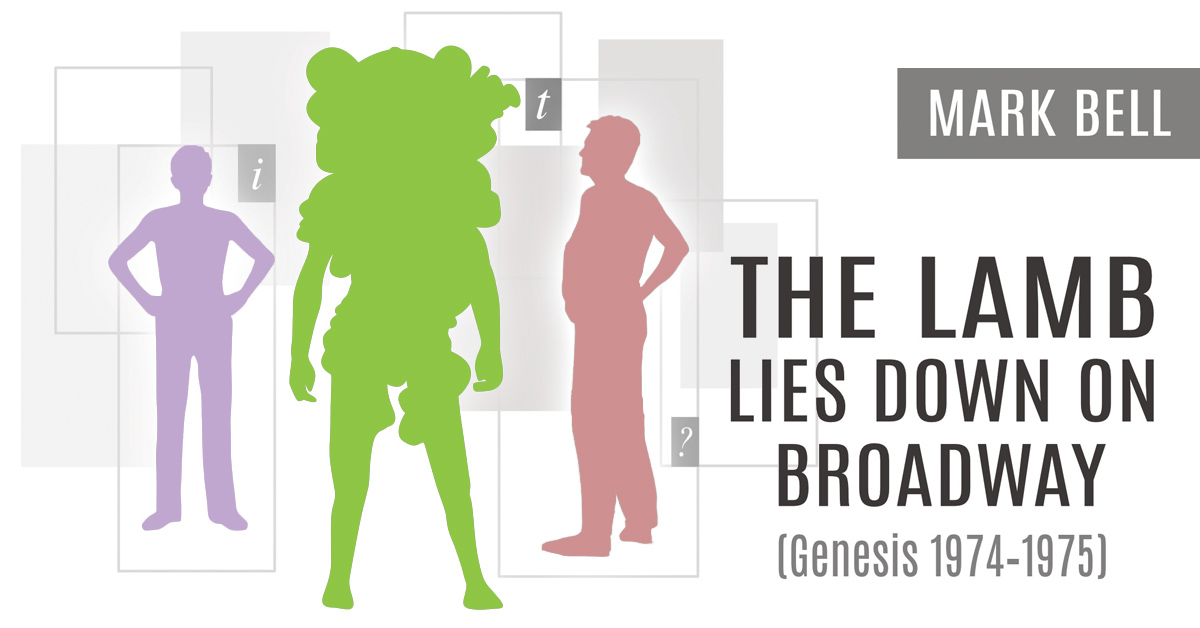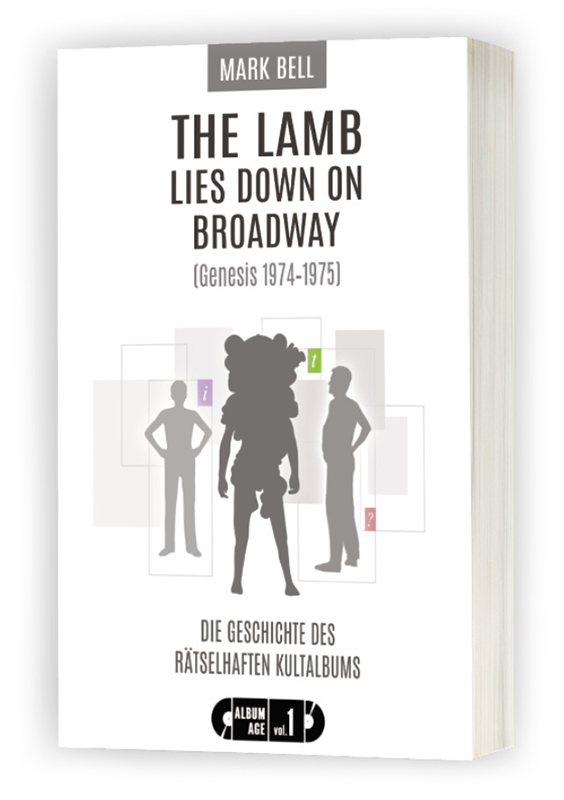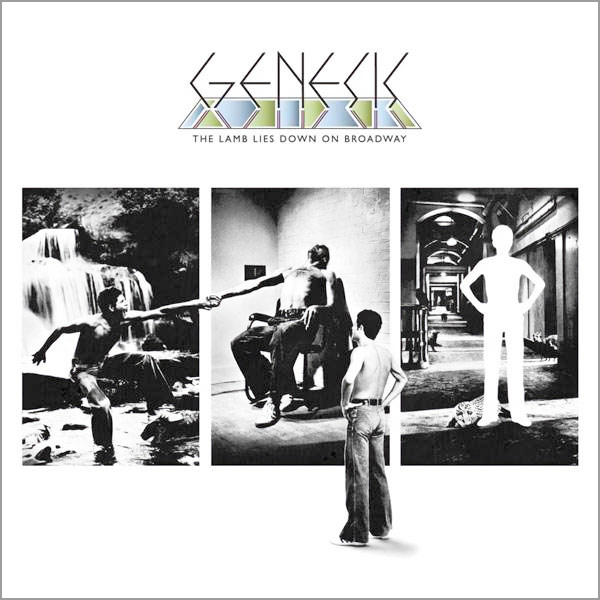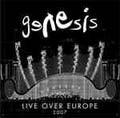


"I still don't understand what The Lamb is about." Many fans will agree with this honest confession by a certain well-known drummer. 23 pieces with and without lyrics, plus an accompanying story whose plot sometimes seems very frayed because of the author's sheer joy of allusion, lots of whimsical images, characters, moments ... and even those who have paid most careful attention to a whole chain of The Lamb concerts by the excellent Canadian band The Musical Box will probably leave the hall afterwards enthusiastic, but nevertheless still rather perplexed than filled with insight.
In the beginning, Lamb-researchers had to sift through massive amounts of interviews and articles like a gold panner in order to catch a crumb of information about The Lamb here and there. The information situation improved a lot with Chapter & Verse and especially with Kevin Holm-Hudson's monograph about the album, in which the plot and the interpretation are thematized but do not play the main role.
 Like a bolt from the blue, the book The Lamb Lies Down On Broadway (Genesis 1974-1975) by Mark Bell was published in Germany in late November 2022. An international release followed in late January 2023. Subtitle and blurb promise much: the "exciting story of the album's creation" is reconstructed, and the book "explain[s] piece by piece the mysterious content". Not to mention a section on the live tour performance, Gabriel's exit, and the album's legacy. With that, 456 pages can be filled quite comfortably. However, you always have the fans of the album breathing down your neck and ready to agree, the fans who, very legitimately, all bring their own ideas and the question whether the author has not taken the mouth quite full.
Like a bolt from the blue, the book The Lamb Lies Down On Broadway (Genesis 1974-1975) by Mark Bell was published in Germany in late November 2022. An international release followed in late January 2023. Subtitle and blurb promise much: the "exciting story of the album's creation" is reconstructed, and the book "explain[s] piece by piece the mysterious content". Not to mention a section on the live tour performance, Gabriel's exit, and the album's legacy. With that, 456 pages can be filled quite comfortably. However, you always have the fans of the album breathing down your neck and ready to agree, the fans who, very legitimately, all bring their own ideas and the question whether the author has not taken the mouth quite full.
The first five chapters trace the genesis of the album, starting with the situation of the band in particular and the world of music (press) in general. Here you can tell the author is a historian. His reconstruction of the events is very plausible, and from the multitude of sources and materials consulted, he brings to light many a little-noticed and yet exciting detail.
In chapter six, Bell considers the theme and possible sources of inspiration for the plot of The Lamb. He makes the case with that Peter Gabriel has processed his own position in relation to the other band members as well as the psychological turmoil he was in during those days in the story. And he makes it well, citing many sources. Fortunately, Bell has also largely not succumbed to the temptation of circular reasoning, i.e. to infer things about Gabriel's psyche by interpreting the Lamb lyrics.
The seventh chapter is devoted to the individual pieces of the album. Here Bell sticks to a tripartite structure by describing the events of the song, describing the music and commenting on the action in an interpretive way. It is almost inevitable that the book deviates here from the focus on the facts that is otherwise carefully maintained. It is something we observe but do not mean to criticize in any way.
At this point it would be tempting to run through some of the interpretations (at least for the reviewer) that we have not been seen before (e.g. Bell's take on what the lamb stands for), or to praise other interpretations for their illuminating presentation, or to criticize others again for seeming to put more into the text than can be extracted. We refrain from doing so here. Whether you agree with the offered interpretations or not is up to you, the reader. We would like to point out this, though: The interpretations subordinate themselves altogether to the thesis developed at the beginning, namely that The Lamb is a key text to Peter Gabriel's mental state in the summer of 1974. Bell makes the case for this by making transparent how he came to his conclusions, and he cites a large number of sources (the number of footnotes runs well into the thousands). Even if some readers are very reluctant to see footnotes in their books, they are an undeniable plus point here: you can go directly to the many named sources and check Bell's argumentation. How one would have wished for this in other books about Genesis and Peter Gabriel!
The third main part looks at the tour with which Genesis brought The Lamb Lies Down On Broadway to the stage in 1974 and 1975. We haven't seen it spelled out so clearly what an almost insane risk it was for Genesis to go on tour with a complete performance of the album. The stage show is discussed from the stage setup to the lighting and special effects to the slide projections, with Bell also discussing technical aspects of the show's development. Introduced by a listing of the concerts of each tour leg (North America, Europe, Great Britain), Bell outlines what has changed from the previous one and reports on the familiar curiosities. Here, too, he unearths new details, for example about the "concert with the big bang effect" in Oslo.
Woven into this chapter is the tour's most momentous event for the band's history, namely Peter Gabriel's announcement that he was leaving the band. A separate chapter is devoted to this event and its resounding consequences, which deals less with the decision as such than with how those involved dealt with it, and necessarily also takes a look beyond the time frame of The Lamb.
 The last section of the book is devoted to the reception history of The Lamb Lies Down On Broadway, from its gradual recognition as a highpoint of progressive rock to the failed plans for a film version. Bell does not make the mistake of leaving the revivals or new recordings unnamed. Besides (almost) "purely musical" projects like Kevin Gilbert's live performance or Nick D'Virgilio's Rewiring Genesis, Bell also pays tribute to fan projects like Serge Morrissette's impressive reconstruction of a Lamb film using preserved film snippets from all kinds of sources. Among other cover and tribute bands, of course, special mention is made of the Canadian band The Musical Box, who, with Genesis' official blessing, have put on an incredibly accurate and stunning performance not only of the music but of the entire show. In the epilogue, the author, quite the historian, goes into why those involved - musicians, roadies, managers, fans - inevitably look back on their time with The Lamb Lies Down On Broadway in very different ways, before summing up and giving the band members the final word, as it were, in which a rather ambivalent attitude to the album is expressed.
The last section of the book is devoted to the reception history of The Lamb Lies Down On Broadway, from its gradual recognition as a highpoint of progressive rock to the failed plans for a film version. Bell does not make the mistake of leaving the revivals or new recordings unnamed. Besides (almost) "purely musical" projects like Kevin Gilbert's live performance or Nick D'Virgilio's Rewiring Genesis, Bell also pays tribute to fan projects like Serge Morrissette's impressive reconstruction of a Lamb film using preserved film snippets from all kinds of sources. Among other cover and tribute bands, of course, special mention is made of the Canadian band The Musical Box, who, with Genesis' official blessing, have put on an incredibly accurate and stunning performance not only of the music but of the entire show. In the epilogue, the author, quite the historian, goes into why those involved - musicians, roadies, managers, fans - inevitably look back on their time with The Lamb Lies Down On Broadway in very different ways, before summing up and giving the band members the final word, as it were, in which a rather ambivalent attitude to the album is expressed.
The Lamb Lies Down On Broadway is, as is repeatedly hinted at in the book, only the first part of a larger series that will, as we conclude from the pointers, discuss at least three or four more Genesis albums. It looks at the album in its complex prehistory and genesis, its existence as a studio album and as a live performance, and finally in its aftermath and resurgence. The common thread is the theory of The Lamb as a coded reflection of Peter Gabriel's psychological state. The book reads smoothly, even if the author occasionally gives in to a slight tendency to convoluted sentences. It was also pleasant that in the later chapters the number of sensationalistic adjectives such as "mysterious" gives way to a more sober mode of expression.
To vary a phrase from the Epilogue (p.434): With The Lamb, Bell has set a high standard in several respects. The Lamb Lies Down On Broadway by Mark Bell will be the new standard against which other books on Genesis will have to be measured - in terms of depth of interpretation, abundance (and citation!) of evidence, and consistency of perspective. Those who "have not understood what The Lamb is about until today" will get a good hunch here. With this book (and supplementing those of Giammetti and Holm-Hudson) the reader has for now everything he needs about The Lamb.
December 2022 | Martin Klinkhardt
The book is available in German language at amazonDE (but also all other international amazon websites such as amazonUK).
An English version of the book has now been published (29 January 2023) and is available at amazonUK, amazonCOM, amazonIT, amazonFR and amazonJP!
You can discuss this book in our forum here.
The Author:
Mark Bell has been an intense fan of The Lamb Lies Down On Broadway, its accompanying history and revivals through The Musical Box. In the process, his need to find a (German-language) book that would help him sound the depths of the work that keep appearing behind its audible and visible elements grew stronger. Such a book did not exist until now, and he could not get anyone to write it for him. So he wrote it himself. Dr. Mark Bell holds a doctorate in history and cultural studies.



Live-Double-album of the 2007 Turn It On Again-Tour.
Review available